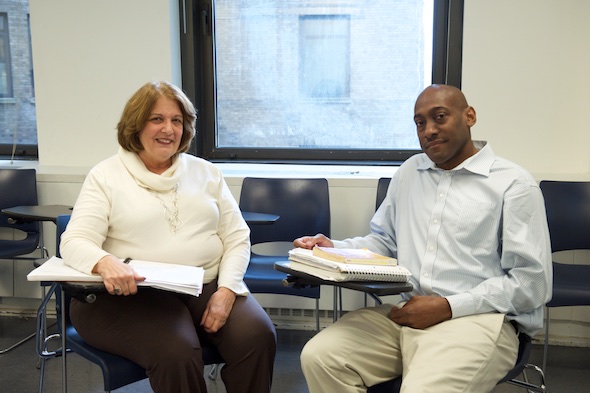
Nancy Waltzer earned a bachelor’s degree in education at SUNY Stonybrook, then a paralegal degree at Adelphi University. Well educated and good at what she does, she nonetheless found herself unemployed at midlife, and looking for a new career.
“I started as a paralegal, and worked as an executive assistant at Pricewaterhousecoopers in the nineties, then at a couple consulting firms till 2006,” she says. “When downsizing started happening in the finance industry, I was laid off.”
She next found employment at a family-owned manufacturer of ribbons and packaging goods—a company that went out of business in 2009.
Fortunately, though, she had a back-up plan.
“I’m also a licensed massage therapist,” she says, having attended the Swedish Institute College of Health Sciences in Manhattan. Her efforts didn’t yield a new career, but it tapped into an interest she didn’t even know she had.
“I love learning about anatomy, the workings of human physiology,” she says. “We had to learn pressure points, and every bone in the body.”
When she heard through AARP about the MAS (Medical Assistant Specialist) program at BMCC’s Center for Continuing Education and Workforce Development, she was intrigued.
Waltzer started her MAS training at BMCC in Fall 2014, and is scheduled to begin a 180-hour internship in a clinic or hospital setting in February 2015.
After that, she’ll take the MAS online exam through the National Healthcare Association, and with industry-respected certification and a solid internship under her belt, she’ll be well prepared to embark on a new career.
Customizing a career path
Clinton Gadson also attends the MAS program at BMCC.
A former reference librarian, he earned a bachelor’s degree in philosophy at SUNY Buffalo in 1987, and launched a promising career in the finance industry.
He started as a Library Assistant at Salomon Brothers and next landed jobs as a Research Assistant at Morgan Stanley, an Information Specialist at Chase Manhattan Corp, and a Reference Librarian at both SG Cowen and UBS.
Then in 2008, he found himself unemployed, caught in the same downsizing wave as Nancy Waltzer.
“I did some reflection,” he says. “I had always loved science. I asked myself, ‘Do I go back to school and get an MLS, a Master of Library Science degree? Or do I follow my real passion?’”
That’s when he began taking pre-med courses at City College of New York, CUNY, a departure from the field in which he had just invested over 20 years.
“Coincidentally, I noticed I was getting AARP stuff in the mail,” he says, “and they sent me a flyer about a BMCC orientation for a program that offered two paths: job placement or MAS training.”
Like Waltzer, he chose the MAS training, and started in Fall 2014.
“I thought working as a certified medical assistant would help me get my foot in the door as a nurse practitioner,” says Gadson. He plans to work as an MAS by day and complete his associate degree in nursing through BMCC’s evening and weekend program.
Waltzer, on the other hand, intends to use the MAS training to segue into working with electronic health records.
“It’s right up my alley,” she says. “You name the disease, I can name the symptoms.”
Soon they’ll enter the final phase of their MAS training, an internship at the New York Simulation Center for Health Sciences at Bellevue Hospital on Manhattan’s East Side, and take the MAS certification exam.
Countering age bias
“According to AARP, more than three million workers over the age of 50 are looking for full-time employment,” says Donna McLean Grant, Director of Allied Health Programs at BMCC’s Center for Continuing Education and Workforce Development.
“We open a platform for the participants to speak about the resistance they’ve encountered interviewing, and we give them techniques on how to go around that.”
She says the reality is that ageism exists in the workplace.
“So what do you do? You emphasize your transferable skills, develop strong communication and customer service skills.”
The MAS program at BMCC is part of AARP’s Back to Work initiative, which is expanding through community colleges and workforce investment boards (WIBs) across the country.
In addition to the job development team on staff at BMCC, “we work with Workforce 1 and AARP’s Senior Community Service Employment Center; there are five of those in the NYC metro area,” says Grant.
A high-demand field
According to the Bureau of Labor Statistics, employment of medical assistants is projected to grow an impressive 29 percent from 2012 to 2022.
“Partly this is because the baby boomers are reaching a point where they all need medical services at once,” explains Wanda Izquierdo-Ortega, Program Manager of Allied Health Programs at BMCC’s continuing education department.
“MAS certification gets their foot in the door and really improves their job prospects, whether they want to work as an MAS or eventually earn a degree to become an RN.”
Follow your passion
Nancy Waltzer and Clinton Gadson have these words of encouragement to people over 40 looking for work.
“Follow your passion. Now that you have to reinvent yourself, think about what you really want to do,” says Waltzer. “Have an open mind to the different possibilities.”
Clinton Gadson offers this: “You have marketable, transferable skills. They give you an edge over other job seekers, and you can translate them to another career.”
For more information on the MAS program in BMCC’s Center for Continuing Education and Workforce Development, call 212-346-8410.
STORY HIGHLIGHTS
- Adult students train for Medical Assistant Specialist certification
- Classes offered through BMCC’s Center for Continuing Education and Workforce Development
- Part of AARP’s Back to Work initiative, the program also offers career counseling

